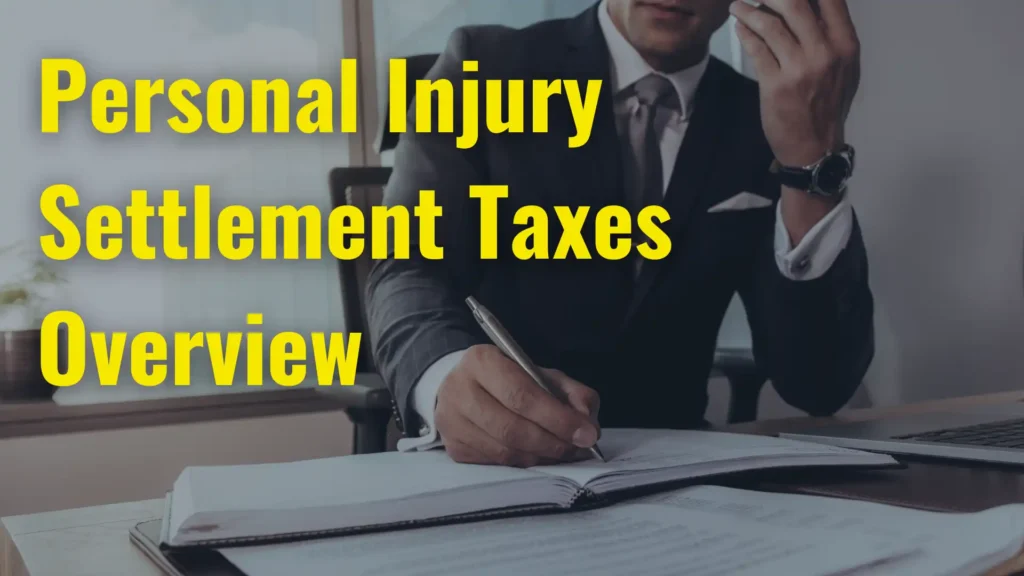
Hurt in an accident? Filing a personal injury claim can help you recover the costs of medical bills, lost wages, and more. However, you might have concerns about whether you’ll need to pay taxes on this compensation. The good news is that most of the money you receive in a personal injury settlement is not taxable. There are specific situations where some parts of your settlement could be taxed, however. Understanding these nuances is essential to avoid unexpected tax bills or other legal complications.
Working with our personal injury lawyers can help you address these complex issues and reduce your tax liability. The team at Gatti, Keltner, Bienvenu & Montesi, PLC has over 40 years of experience helping people like you recover fair compensation for their injuries, and we understand the complicated tax laws that apply to settlements. Below, you’ll find critical information on when you might have to pay taxes on a personal injury settlement and how to reduce your tax burden.
State Incomes Taxes on Personal Injury Settlements
People worry about paying taxes on personal injury settlements because they have concerns about whether the money they receive qualifies as income under state and federal tax laws. You will not have to pay state income tax on a personal injury settlement in Tennessee. The state does not have its own income tax. While Arkansas and Mississippi both have state income taxes, they also exclude most settlements from gross income for the purposes of taxation.
Do You Have to Pay Federal Income Tax on Personal Injury Settlements?
Federal tax laws are complicated and can be challenging to understand. According to IRS guidelines, however, the money you receive from a personal injury settlement usually does not qualify as income under federal tax laws. That means you likely will not have to pay federal income taxes on your settlement.
This rule makes sense when you think about the purpose of a personal injury claim. Remember, the goal in these personal injury cases is to recover compensation to compensate for your losses from an injury someone else caused. The money you receive in a settlement is meant to make up for the money you’ve lost (for example, your lost wages if you can’t work due to your injuries) or have already spent (such as the cost of your medical treatments). Compensation from a settlement, therefore, is not “income” in the traditional sense of the term.
There are different IRS rules for various types of compensation from a personal injury settlement. Here are some general guidelines to keep in mind regarding when the money from a settlement qualifies as taxable income according to the IRS:
Get a free case review today. There`s no fee unless we win!
Compensation for Physical Injuries or Illnesses
- Non-Taxable: The total amount is non-taxable if you receive a settlement for physical injuries or an illness and don’t take an itemized deduction for related medical expenses in previous years.
- Taxable Portion: If you deducted medical expenses related to the injury or sickness in previous years and received a tax benefit from those deductions, you must include that portion of the settlement in your income.
Over $500 Million
Recovered on Behalf
of Our Clients
Emotional Distress or Mental Anguish
- Non-Taxable: If the emotional distress or mental anguish stems from a personal physical injury or sickness, the IRS treats the settlement as a settlement for bodily injuries or an illness.
- Taxable Portion: The proceeds are taxable if the emotional distress or mental anguish is not related to a personal physical injury or sickness. You can, however, reduce the taxable amount by the amount of any related medical expenses you did not previously deduct. You can also reduce your taxable portion of a settlement by subtracting the amount of any medical expenses you deducted but didn’t get a tax benefit from.
Fighting for the MAXIMUM
Money for You
Lost Wages or Lost Profits
- Lost Wages: Settlements for lost wages from employment-related lawsuits, such as for unlawful discrimination or involuntary termination, are taxable and subject to employment tax withholding. Compensation for lost wages in a personal injury settlement is generally not taxable, however.
- Lost Profits: Settlements for lost profits from your trade or business are taxable. You must report any settlement in these situations as business income. These proceeds are also subject to federal self-employment taxes.
Put Montesi`s Power
Lawyers to Work for You
Interest
You might not receive your full settlement amount immediately. If you receive a structured settlement, you might earn interest on your settlement. Interest on any personal injury settlement is generally taxable.
Punitive Damages
Punitive damages do not compensate you for an accident-related loss. Instead, the point of punitive damages is to penalize the defendant for their actions. Punitive damages in a personal injury settlement are nearly always taxable. You should report this portion of your settlement as income.
Do You Have to Report the Money from a Confidential Settlement?
Many personal injury claims end in confidential settlements. This protects the defendant’s reputation and keeps the case out of the public eye. While the defendant in your case might want to keep the settlement confidential, the IRS requires you to report any qualifying income from your settlement on your tax return. Failing to report qualifying parts of your settlement on your tax returns could have severe legal implications.
How We Can Help You Minimize Your Taxes on a Personal Injury Settlement
At Gatti, Keltner, Bienvenu & Montesi, PLC, we can help you address the complex tax implications of a personal injury settlement in Memphis. Once we help you win your case, we will review your settlement details to identify which portions may be taxable. By carefully structuring your settlement, we can minimize your tax liability and help you comply with IRS regulations. We’ll guide you through the documentation process and help you complete all necessary tax forms correctly.
Our team will also work closely with your financial advisor or accountant to develop a comprehensive tax strategy. This way, you can focus on your recovery while we handle the legal and monetary details.
Our attorneys have handled notable cases similar to yours and they can give you input on what you need to know in your case. We’re ready to answer your questions about taxes on personal injury settlements or any other aspect of your case. Contact our law firm online or at (901) 526-2126 for a free consultation, or complete our online contact form.

